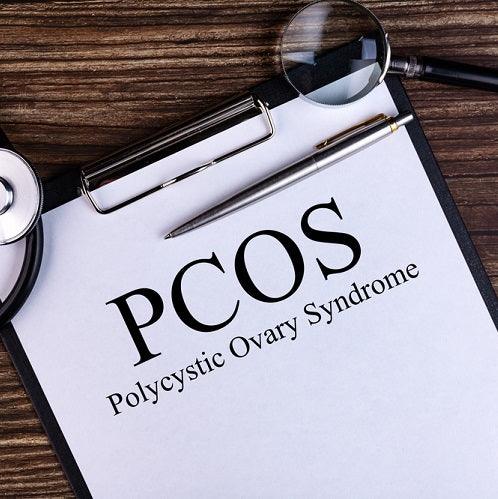
How to Lose Weight with PCOS and Transform your Health
If you’ve been on the internet for five minutes you’ve been told you just have to buy someone’s course to finally lose that last ten pounds, or you can cure your PCOS by following this Amazon affiliate link. While I wish there was a quick fix for many women’s health issues, there unfortunately is not.
PCOS (polycystic ovarian syndrome) is a complicated syndrome because we do not know the root cause. I once worked with a doctor who said, “syndrome is a fancy way of saying here’s a whole bunch of symptoms and we don’t know what causes them”. That leaves us to treat the symptoms, until we can potentially some day find a root cause. Some PCOS patients utilize medications like birth control to regulate menses, Spironolactone to help with acne and hair growth, or supplements like Inositol. But that leaves symptoms like weight gain and insulin resistance, which are often much harder to deal with.
PCOS and Weight Gain
As many as 4 in 5 women with PCOS are obese. Per ACOG (the American College of Obstetrics and Gynecology), there is no evidence to support the “PCOS types” theory. Which means that you don’t have to figure out your “type” to figure out how to lose weight with a PCOS diagnosis. What many don’t understand is the vicious cycle of PCOS.
When a person starts to develop insulin resistance (or prediabetes), their body is unable to use insulin. When there is more free insulin and glucose in their bloodstream, this tells the ovaries to secrete more testosterone (aka androgen).
So as your insulin resistance builds, so can the symptoms of PCOS like irregular menses, acne, and male pattern hair growth. Insulin resistance can also lead to excess weight gain and difficulty losing weight. If we can focus on the insulin resistance, we can diminish other symptoms of PCOS, and we can help the patient with PCOS weight loss.
How to Treat Insulin Resistance?
How do we treat insulin resistance? Some patients may start with oral women’s supplements like Inositol and utilize Registered Dieticians to make dietary changes. I always recommend working with an RD if they are available to you, because even if you eat “healthy”, you still may require dietary tweaks to target your insulin resistance.
Foods to Eat and Avoid
When it comes to managing PCOS through diet, what you eat can make a significant difference. The key is to focus on foods that help regulate insulin levels and reduce inflammation. Here are some guidelines:
- Foods to Eat: Following a low-glycemic or diabetic diet is often much different from what you and I grew up eating. These types of lifestyles focus on lean proteins (such as chicken, turkey, and fish), low starch vegetables (like spinach, broccoli, and bell peppers), low glycemic fruits (berries, apples, and pears), and complex carbohydrates in moderation (quinoa, brown rice, and whole grain bread). Healthy fats from sources like avocados, nuts, and olive oil are also beneficial.
- Foods to Avoid: High-sugar foods (candies, cookies, and sugary drinks), refined carbohydrates (white bread, pasta, and pastries), processed food, and inflammatory foods (processed meats, fried foods, and excessive dairy). It's also wise to limit alcohol or moderately consume low sugar options like very dry red wines and caffeine as they can affect your hormonal balance.
This may also change how you choose to eat out, get food delivered, or what alcoholic beverages you partake in. You can challenge yourself to cook at home as much as possible. limit alcohol, or moderately consume low sugar options like very dry red wines. This can seem overwhelming initially, but you will be surprised how many friends and family will be willing to support you in this weight loss journey if you let them know your goals, and what steps you have to take to get there. You can still go out, travel, have fun, and eat a diet that supports your healthy PCOS journey.
Exercise Tips for PCOS
There is not a prescribed type of exercise for PCOS, which means you can do what you enjoy! An overall recommendation would be to include a mix of both cardiovascular and resistance training methods to increase muscle mass, preserve bone density, and reduce stress. There is some evidence to support vigorous intensity exercise as the better choice to improve cardiorespiratory fitness, body composition, and insulin resistance.
A minimum of 120 minutes of vigorous exercise per week was found to have favorable health outcomes in PCOS patients. That doesn’t mean that you need to burn yourself out right away though. It is okay to start with walking if you’ve never worked out before, or if you’re getting back into it. It’s our job as healthcare providers to meet you where you’re at. And then it’s your job to find one or multiple types of exercise you can enjoy enough to do 120 minutes per week, or just under 20 minutes a day.
Medications for PCOS
You may also choose to utilize medications like Metformin or GLP-1s. These medications can often be used in the short term while a patient is also working with an RD team to make long lasting lifestyle changes. Progress can seem slow, as it typically takes 3 months or more to see true laboratory value changes. But that is where working with an RD and following up with your medical provider is important to titrate medication or get better insight into dietary/lifestyle roadblocks. Remember that your PCOS symptoms have been with you for a long time, so they will also take some time to be controlled.
A Well-Rounded Approach to Weight Loss
Now I don’t think the above options are a magic bullet. You should work with your healthcare provider to confirm that there are no other metabolic or hormonal factors contributing to the PCOS weight gain. And we cannot dismiss the environmental factors that play into body weight.
It will be incredibly difficult to start losing weight if you are going through a season of high stress, lack of sleep, etc. This is why a well-rounded approach with your healthcare team is so important. Incorporating PCOS self care practices can also make a significant difference. If you’re concerned about PCOS as a possible cause of weight gain it’s time to talk to your healthcare provider about a PCOS workup including labs and possible ultrasound.
And don’t forget to schedule a follow up to discuss your results and next steps for PCOS treatment. If you are left confused or with a lack of a plan forward, you should consider a second opinion. Your health is important, and it’s worth addressing now with the right group of people who can support you on the road to your best self.






